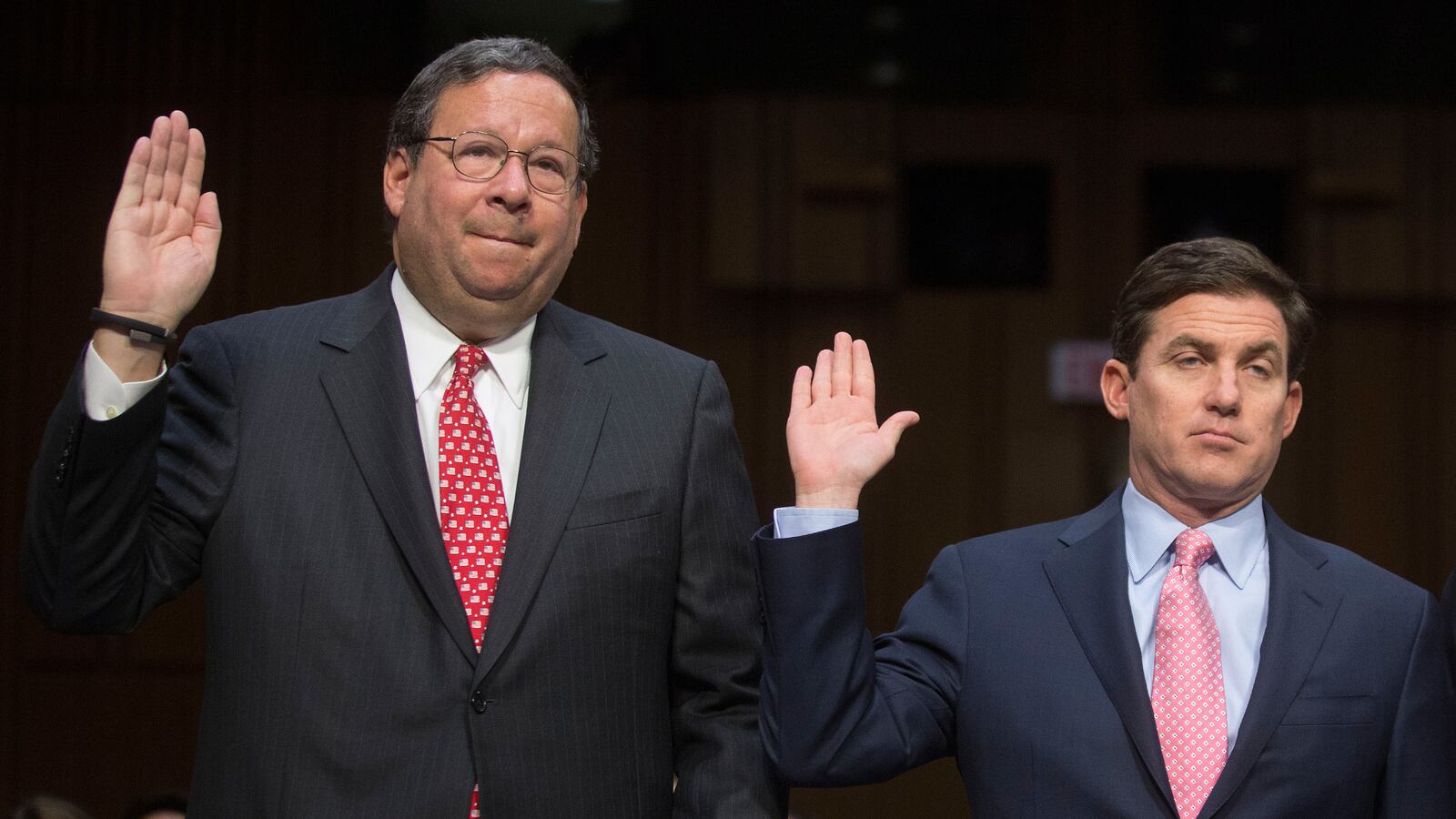For much of Wednesday’s Senate hearing into the proposed $45.2 billion merger of the nation’s two biggest cable television and Internet service providers, Comcast and Time Warner Cable, David Cohen wore a tiny smile.

The round, open face of Comcast’s top lobbyist and spin doctor—framed by non-threatening wire-rimmed specs—formed itself into a cat-who-ate-the-canary grin, even as various senators, both Democrats and Republicans, raised questions about the troubling impact such a corporate fusion will have on competition and consumer choices, along with rising prices. After all, it would make the combined company the sole cable distributor in 27 of the top 30 U.S. media markets, and possibly give the new entity control of 50 percent of America’s broadband coverage.
Combined with Comcast’s ownership of NBC Universal—which boasts a broadcast television network, 20-odd cable outlets, and several regional sports networks, not to mention a Hollywood studio—that could create a monster wielding irresistible market leverage, several senators and witnesses argued.
But Cohen was unfazed. "Once again, the customers are the winners here,” he argued at one point, finding different ways to say the same thing, over and over. “I have a nasty little habit of telling the truth,” he confessed at another point in the hearing. (He was acknowledging that he once told reporters, shortly after the merger plans were announced in February: “We’re certainly not promising that customer bills are going to go down or even increase less rapidly.”)
Cohen—the cable giant ‘s executive vice president in charge of corporate communications and government and regulatory affairs—has more than 100 Washington lobbyists working for him, to say nothing of tens of millions of dollars at his disposal for campaign contributions and generous donations to the pet charities of key lawmakers. He might as well have been presiding instead of the Judiciary Committee chairman, Vermont Democrat Patrick Leahy. His testimony was a triumph of Washington performance art.
“You seem like a pretty good salesman,” Sen. Al Franken of Minnesota told Cohen at one point, although he didn’t necessarily mean it as a compliment. The former Saturday Night Live performer—the only committee member who has dared to oppose the deal in public--spent the three-hour hearing fencing with Cohen over Comcast’s allegedly greedy and monopolistic behavior.
But he barely inflicted a scratch, let alone drew blood.
That role was left to Leahy, who gracefully disemboweled Cohen’s fellow witness in support of the merger, Arthur Minson, Time Warner Cable’s chief financial officer. Noting that Minson stood personally to gain a $27 million windfall from the completed deal, while his boss, TWC chief executive Robert Marcus, would get $80 million, Leahy sweetly asked: “Do these golden parachutes help your shareholders?”
Minson responded—in standard deer-in-the-headlights fashion—by pretending Leahy had asked him instead to repeat all the wonderful reasons why the merger would be fabulous in every way for America’s consumers, until the chairman stopped him cold and demanded an answer.
“I think you’ll find that they’re in line,” Minson murmured, looking red in the face—presumably meaning "in line" with industry standards for obscenely huge executive payouts.
Among the other witnesses--all of whom were under oath and sworn in by Leahy—former Justice Department anti-trust lawyer Gene Kimmelman testified that the merger “will put Comcast in the driver’s seat” regarding negotiations on carriage fees with content providers, the setting of charges to Internet players like Netflix for unfettered access to Comcast's pipes, and the ability to set consumer prices with minimal competition. He described the new, giant company as “an octopus that has all these tentacles out there” enabling it to squeeze consumers and competitors alike.
James Bosworth, chief executive of a fledgling golf outlet, the Back9Network (whose $30 million initial capitalization is only $3 million more than Artie Minson’s good fortune), claimed that his talks with TWC suddenly “stalled” after the merger was announced. It turns out the Back9Network is a potential rival to the Golf Channel, a Comcast property, Bosworth said.
University of Pennsylvania law professor Christopher Yoo, a leading expert on technology law and a longtime advocate of free-market policies, argued that the merger would have negligible impact on consumer prices or competition. (Of course, Yoo--whose Center for Technology, Innovation & Competition is partially supported by the cable industry—operates in Comcast’s hometown of Philadelphia; Cohen, coincidentally, chairs the university’s board of trustees—he is nothing if not supremely well-connected.)
Franken, who also opposed Comcast’s successful merger with NBC Universal, tried to get Cohen to admit that Comcast had offered misleading written testimony. The document provided to the committee claimed that regarding government conditions imposed on the previous merger, the Federal Communications Commission (which along with the Justice Department has the authority to decide whether the current merger will go forward) “looked at” only a single dispute, which involved how Comcast sold its bundled services, but failed to mention the FCC’s role in compelling Comcast to remove Bloomberg Television from Siberia in its menu of channels and relocate it in the same attractive neighborhood as other news channels.
Cohen initially dismissed Franken’s complaint. “The Bloomberg issue was not a compliance issue, it was an interpretive issue,” he said, before finally conceding, “I will acknowledge that the word ‘look’ may have not been the best chosen word…We should have had a better use of words in the written testimony and I apologize for that.”
“Accepted!” Franken fired back.
After the sword-play ended and the hearing was done, Cohen’s diminutive, almost surreptitious up-curling of the lip broke into a beaming, ear-to-ear expression of love and joy when the portly executive jumped up from the witness chair to schmooze and glad-hand members and staffers of the Senate Judiciary Committee.
By that point Franken had departed.






